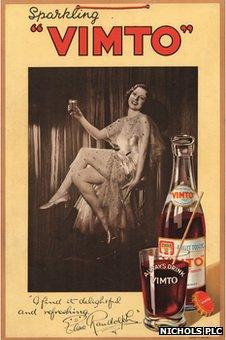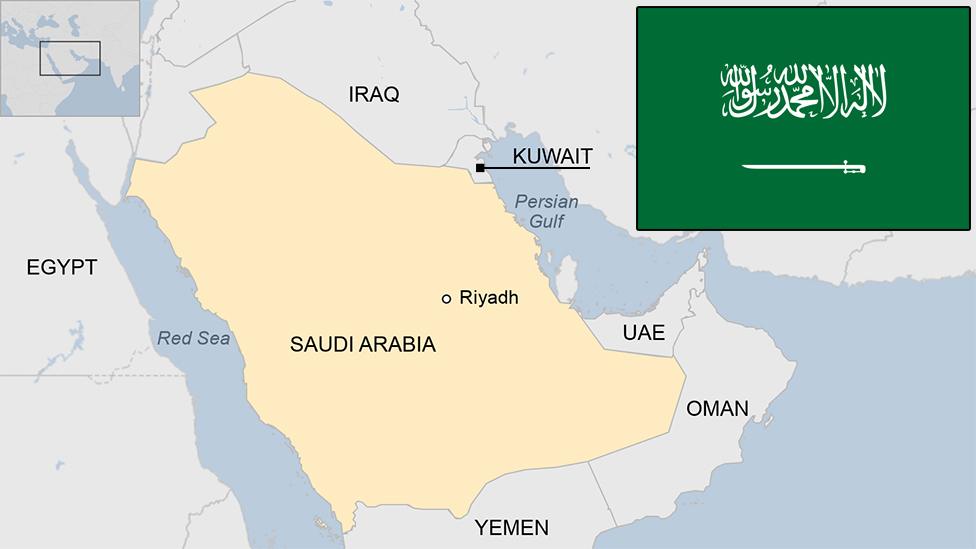Vimto hits purple patch in the Gulf
- Published
Simon Atkinson reports on how the Gulf got a taste for Vimto
It was not immediately obvious what the television advert was actually for.
Perhaps the washing detergent that got the man's traditional Arabic dress - or kandoura - so pristinely white.
Or the shiny silver laptop he was clutching. Or even the smart, chauffeur-driven 4x4 car that whisked him home.
But no.
After 30 seconds of luxury images, complete with rousing Arabic music, it emerged the focus of this very Middle Eastern advert was a soft drink invented in north-west England 105 years ago.
It is all a touch surreal for anyone who remembers adverts for Vimto in the UK - including one featuring a poem about how drinking the stuff would make all the girls want to kiss you.
'Non-alcoholic help'
On a dusty industrial estate on the outskirts of Dammam in eastern Saudi Arabia, you get a sense of how big the Vimto brand is here.
The conveyor belts of the Aujan Industries factory (part of an organisation recently part-bought by Coca-Cola) churn out more than 20 million bottles of Vimto cordial every year.
And almost all of it is destined for Gulf countries such as Kuwait, Yemen, Bahrain and the UAE, as well as Saudi.

Adverts in the Gulf are a far cry from earlier UK marketing campaigns
First sold in the region in the 1920s, and manufactured in Dammam since the 1970s, it is comfortably the biggest market for the drink outside the UK.
"I think there are parts of the Middle East where Vimto is better known than parts of Britain," says John Nichols, non-executive chairman of Nichols Plc, which owns the Vimto brand - and whose grandfather created Vimtonic, as it was first known, in Salford in 1908.
And the irony is not lost on him that a product developed in the temperance movement around the UK has taken root in a part of the world where many are teetotal.
"They like the flavour, and particularly with it being non-alcoholic, that obviously helps," he says,
While ingredients of the drink are a closely guarded secret - reportedly locked in a safe at the Nichols' headquarters - the drink sold in the Gulf is much sweeter than that found in the UK.
"That's historic, from when we used to ship it over there," Mr Nichols says. "It was easier and cheaper to ship highly concentrated syrup, rather then sending water round the world."
Profitable period
But Vimto's Middle East success is not purely down to its taste. It is also a ritual.
Over the past couple of decades the drink has increasingly become associated with the holy month of Ramadan - a period which now makes up more than 50% of the cordial's entire sales.
Many Muslims now choose to end a day of fasting with a date and a glass of the purple liquid - some saying the sugar hit helps give them energy after a day without food or water.
But Meshal Alkadeeb, vice president of strategy and business development at Aujan Coca-Cola Beverages, argues it is more than a mere practicality.
"It's a simple tradition that has taken years to develop," he says.
"How did the turkey become part of Thanksgiving, the Christmas tree become part of Christmas? We think of it very similarly."
Aisle domination
And it is a tradition that makes Ramadan both the firm's most profitable but also tricky period.
"The entire company is geared towards these six to eight weeks - making sure we have the supply chain prepared, the product in the supermarkets properly displayed so that the consumer, when they go shopping for Ramadan items, they find exactly what they expect," Mr Alkadeeb says.
And some of what they find is quite extravagant.
In one supermarket on the outskirts of Dubai, an entire aisle has been taken up with the drink - set in a cardboard castle complete with turrets.
There are 2,000 bottles on display here at any one time.
.jpg)
It is hard to miss the shelf after shelf stacked with Vimto in the supermarkets
Most shops slash prices. Signs advertise bigger discounts for buying it by the carton, each holding 12 bottles.
Even now, two weeks into Ramadan, customers are still picking it up.
One shopper confesses he prefers a similar drink made in Pakistan during the rest of the year, but is sucked in by tradition.
"It's just what we do," he says. "It's what we drank as kids at this time of year and now we do the same."
Problematic perception
In the UK - though sales are still growing - some see Vimto as an old-fashioned product - something they associate with their grandparents' generation.
And with Gulf states having very young populations, that is a perception the brand is keen to avoid here.
"As generations change, the difficulty becomes: how can you take this experience from one generation to another," says Mr Alkadeeb.
"We'd like to think of this generational transition as a very good challenge for us to take on board."
- Published29 August 2023
